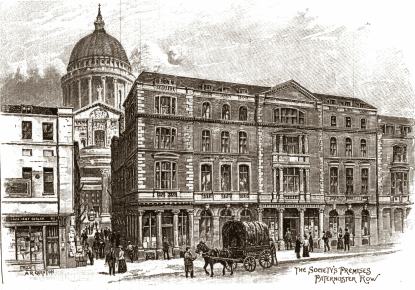
Two contrasting cases today – both involving violence and both from 1880. The first of these brought Daniel McCarthy to court at the Guildhall in the City of London.
Mr and Mrs Fisher were eating their dinner on Saturday afternoon. It was between 1 and 2 o’clock and Mr Fisher had probably spent the morning at his work as a chimney sweep. He had left his ‘sweeping machine’ outside their home in Herring Court, Redcross Street while he settled to eat the meal his wife Ellen had prepared. All of sudden their repast was interrupted by a noise outside.
Ellen got up to investigate and found man in the street chucking a sackful of soot all over the courtyard, with two other men standing nearby. He had knocked over her husband’s machine and when she asked him what he was doing he gave her a mouthful of abuse. Ellen Fisher strode off to find a policeman but none was to be found and she quickly returned. To her horror she now found her husband being beaten up by the man’s mates.
When she loudly protested and threatened to call the police the first man – McCarthy – attacked her. He punched her in mouth, knocking her to the ground. When she hailed herself up he knocked her back down and started kicking her. His heavy boots opened a cut in her head, which bled profusely. Throughout she tried to call for the police but no one came.
Later, after she had reported it to the station and had given a description of the man involved. McCarthy was picked up. One of Mrs Fisher’s neighbors corroborated her testimony and McCarthy was sent to prison for 14 days with hard labour.
Was McCarthy drunk? Did he hold a grudge against the Fishers? Sometimes it is frustratingly difficult to understand why incidents like this happen. We don’t even know McCarthy’s age or his occupation; perhaps he was a rival sweep or maybe Fisher owed him (or someone he worked for) money. The attack seems random and unmotivated, but there may be more to it.
Further east, at the Thames Police court, another case of violence was being heard. Ada Goodchild, (45) was accused of cutting and wounding her 77 year-old husband John.
It wasn’t the first either, as was so often the case with domestic violence there was a history of abuse. What was unusual here was that the abuse was female, and the victim male. It is likely that ‘husband beaters’ such as Ada Goodchild were (and are) more common than records suggest; even today the pressures of conventional ideas of masculinity are likely to put off some men from reporting incidents where their partners have bested them.
John Goodchild stood in court with his head bandaged and testified that Ada had assaulted him a few days previously with a candlestick, but he’d forgiven her and she had promised never to do it again. Her promise didn’t last long.
On Saturday night she had come home drunk, ‘dragged him out of bed, and [had] pelted him with every conceivable item she could lay her hands on’. Ada then seized a knife and went for him with it, cutting him just above his right eye. Bleeding and battered, John Goodchild staggered out of the house in Wells Place and went to find a policeman. Ada was arrested and brought before Mr Saunders at Thames on the following Monday morning.
The magistrate upbraided her and said that if he carried on like this she would end up hanging for the murder of her spouse. For wounding John she was sentenced to two months imprisonment with hard labour. The couple was separated and we can only hope that the justice’s lesson was learned.
Again, we have no idea what caused the rift between Ada and her husband. The age gap was huge and perhaps that was an issue – John perhaps wanted his wife to stay at home, while she sought company and perhaps extramarital relations with men younger than her husband. We can try and imagine her motives but it may be as simple as her being unable to control her temper when she was drunk.
Whatever the case for the next 2 months John would have to cope without his wife at home. Just as female survivors of domestic violence often had to weigh up the consequences of prosecuting their abusers, John Goodchild’s decision to go to
law may have temporarily given him peace but he would have to face Ada’s possible wrath when she retuned, and make his own supper and wash his own clothes while she was incarcerated.
Lloyd’s Illustrated Newspaper, Sunday 10 October 1880



![london-bucklersbury-in-simple-time-antique-print-1845-71415-p[ekm]372x400[ekm]](https://thepolicemagistrateblog.files.wordpress.com/2020/08/london-bucklersbury-in-simple-time-antique-print-1845-71415-pekm372x400ekm.jpg)



 The captain had purchased it in Siberia and when the policeman had stopped him he was on his way to Sandringham to deliver it to his highness. So what sort of dog was it?
The captain had purchased it in Siberia and when the policeman had stopped him he was on his way to Sandringham to deliver it to his highness. So what sort of dog was it?  Quite possibly a Siberian Mastiff (see image), these were large dogs indeed and probably quite an outlandish sight on the streets of the capital in 1889. It could have been a Husky of course, more popular today and perhaps more familiar, but not particularly large.
Quite possibly a Siberian Mastiff (see image), these were large dogs indeed and probably quite an outlandish sight on the streets of the capital in 1889. It could have been a Husky of course, more popular today and perhaps more familiar, but not particularly large.

